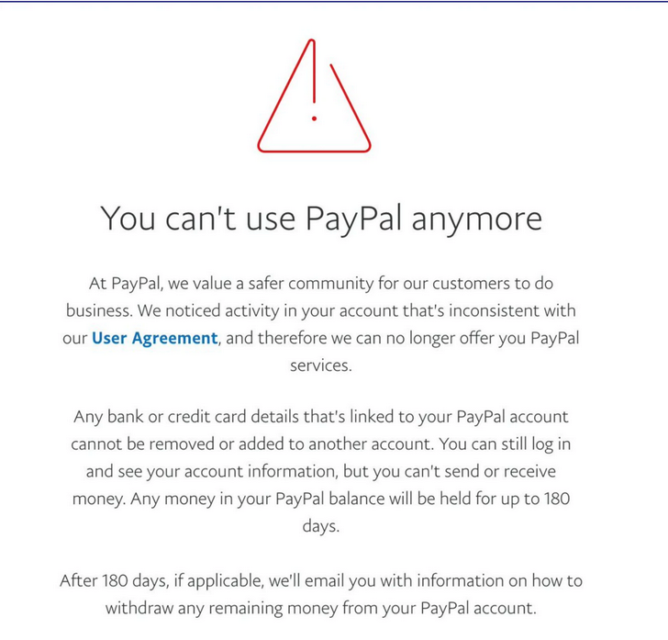Canada’s current Prime Minister found a neat work-around to punish peaceful protestors and their small-scale financial backers by getting Canada’s chartered banks to freeze their bank accounts and credit cards. He didn’t bother getting a law or even an Order-in-Council to do this. He merely had the Finance Minister have a friendly chat with the banks’ CEOs and it was a done deal at least for a few hundreds or thousands of Canadians. PayPal clearly admires Justin Trudeau’s forthright moves to crush dissent and — being a financial institution itself — has been doing similar things to wrongthinking individuals and organizations who (used to) use PayPal’s services:
If you’re one of the lucky ones and your account has just been suspended, you can go to customer service, explain your situation and hope that someone gets back to you. If you’ve been banned, you’ll need an attorney to file a subpoena for the internal PayPal documents — simply to learn why you’ve been banned. (Good luck getting unbanned.)
These are entrepreneurs, writers, academics, activists — the very same people PayPal, whose mission is “democratizing financial services”, was meant to empower.
PayPal won’t say how many of them it has suspended or banned. In June 2021, the Electronic Frontier Foundation and other civil-liberties groups wrote a letter to PayPal and Venmo, calling on them to open up. So far, they have not, said Aaron Terr, director of public advocacy at the Foundation for Individual Rights and Expression.
The people who founded PayPal — the so-called PayPal Mafia — include Peter Thiel, Elon Musk, David Sacks and Max Levchin. All are champions of free speech. All have expressed shock and dismay at what is happening to the company they created. Several founders agreed to talk with The Free Press for this article.
“If the online forms of your money are frozen, that’s like destroying people economically, limiting their ability to exercise their political voice”, Thiel told me. “There’s something about destroying people economically that seems like a far more totalitarian thing.” [Justin Trudeau smiles]
When they launched PayPal, in December 1998, the founders imagined themselves connecting people to the global economy by sidestepping the hefty fees charged by credit-card companies and the inflationary policies of poorly run governments. Early PayPal users had Palm Pilots, and they would beam money from their devices to anyone with an email address. It was especially popular among eBay users.
“PayPal will give citizens worldwide more direct control over their currencies than they ever had before”, Thiel said at a company meeting, in late 1999. “It will be nearly impossible for corrupt governments to steal wealth from their people through their old means, because if they try the people will switch to dollars or pounds or yen, in effect, dumping the worthless local currency for something more secure.”
Since those early heady days, PayPal has amassed 429 million active accounts. Fifty-eight percent of Americans use PayPal, and in 2021, there were 19.3 billion PayPal transactions. It now has a market valuation of $84 billion.
But the company that was meant to liberate countless individuals is becoming something else.
Increasingly, it is becoming a police officer. It is deciding what is right and wrong, who gets to be heard, who is silenced. It is locking out of the financial system those people or brands that have slipped outside the parameters of acceptable discourse, those who threaten the consensus of the gatekeepers. The consensus is hard to articulate; it is an ideology lacking clearly defined ideological contours. But the tenets of that consensus are unmistakable: the new progressive politics around race and gender are a force for good, the Covid lockdown was just, the war in Ukraine is noble, and an unfettered exchange of ideas and opinions is an unacceptable threat to all of the above.
A cynic might say that the original idea, “democratizing financial services”, has been implemented with a capital “D” which makes it all make sense in an American political context.





